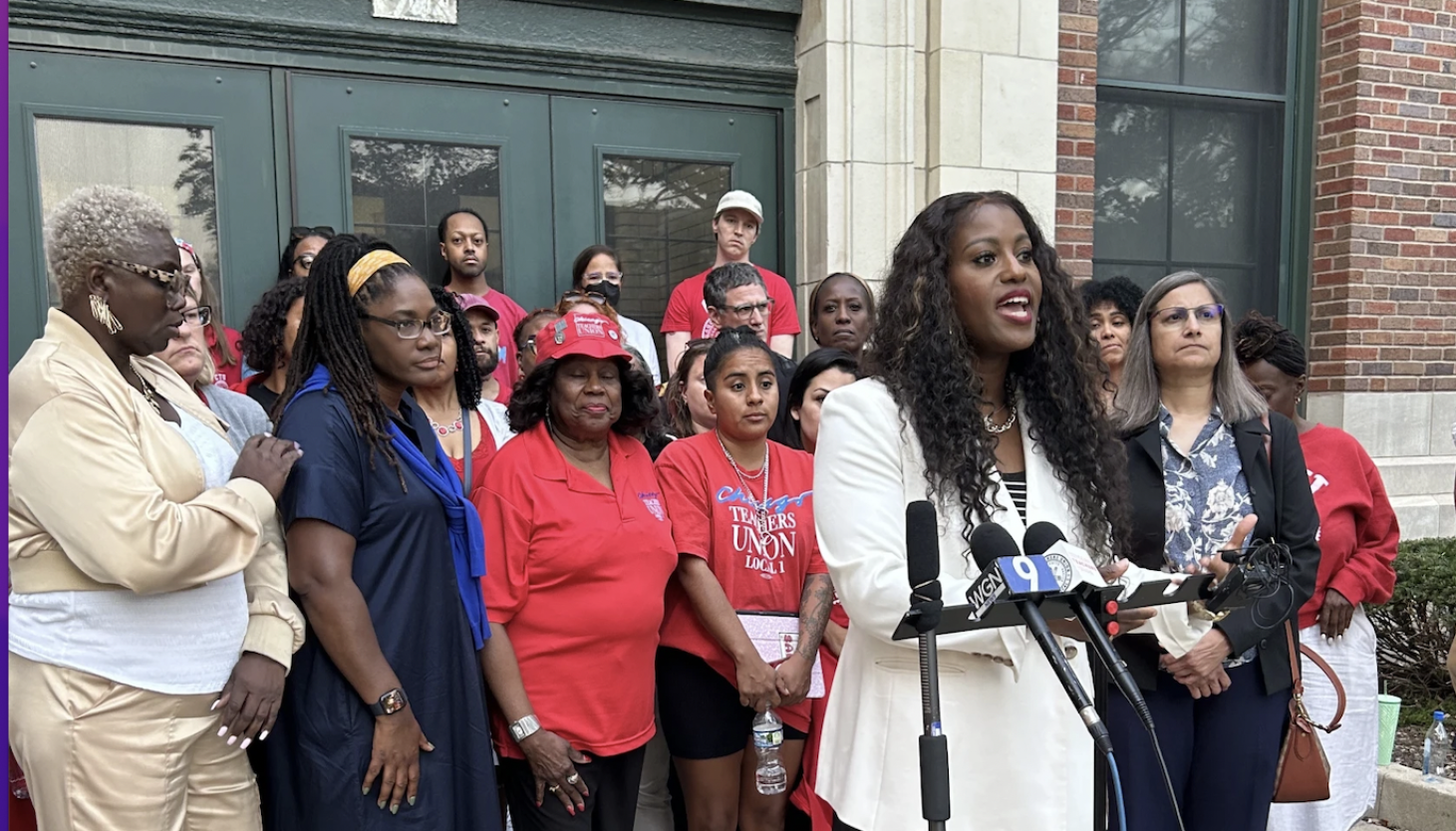The Chicago Teachers Union is asking for an outside mediator to intervene in contract negotiations with Chicago Public Schools — taking the first official step in the lengthy legal process before calling a strike. But the move comes as the whole state of talks could change as the mayor considers replacing the head of the school system.
CPS CEO Pedro Martinez’s trouble appears to be, at least in part, due to a breakdown in contract negotiations with the CTU, which is closely aligned with former union organizer Mayor Brandon Johnson. And if Martinez were to be replaced, as the Sun-Times and WBEZ reported could happen, it would likely be with someone charged with making a deal with the CTU.
Zeidre Foster, who is part of CTU’s bargaining team, said the union decided to ask for outside help in settling the contract because they’ve been unable to reach agreements on major issues. With an ally in the mayor’s office, she said the union thought negotiations would be smoother.
“We don’t believe we should be on different sides of this if our goal is to improve the education of children,” she said. “So it is disappointing.”
Thad Goodchild, deputy general counsel for the CTU, added that Martinez and his team haven’t “understood [that] … their assignment was collaboration and partnership with the CTU to figure out how to provide fully resourced schools for every CPS student.”
Union leaders said the request for a mediator isn’t a signal that a repeat of the 2019 walkout is on the horizon, though they haven’t ruled that out. Unlike in the past when they called for a mediator with the intent to initiate the strike process, this time they said they really want someone to help them land a contract.
CPS officials said this week that they welcome a mediator.
“Mediation is designed to help facilitate productive discussion and bridge disagreements,” a district spokeswoman said in a statement. “We believe this process will be instrumental in finding common ground and moving forward with an agreement that supports our educational goals, including protecting our students, classrooms and staff.”
If Martinez is dismissed, the need for a mediator and likelihood of a strike could diminish.
The strife is largely spurred by differences over how to address a structural budget deficit and historical underfunding.
The CTU has advocated for a more aggressive approach: cementing the resources they believe are needed in the CPS budget and CTU contract, then joining with CPS officials to try to force Gov. JB Pritzker and state lawmakers to provide the necessary funding.
The union wants every school to have art and physical education teachers, teacher assistants and enough teachers for what they deem as reasonable class sizes. The CTU also wants elementary school teachers to get more planning time and for teachers to be able to choose their curriculum.
And the union is looking for raises for its members, which include teachers, clerks, counselors and other staff members. School support staff represented by SEIU Local 73 reached a contract deal in May with at least 4% raises across all four years.
Johnson and his deputy mayor for education, Jen Johnson, who used to be the union’s former chief of staff, have appeared to back the union’s plan. The mayor had been pushing for CPS to take out a short-term, high-interest loan to pay for a CTU contract and buy time to fight Springfield.
But CPS officials, who generally agree with most of the resources CTU wants in schools, have taken a more cautious approach since they were rebuffed by Springfield last spring in their requests for more state funding, and they aren’t guaranteed to succeed next time, either. CPS officials already closed a $505 million deficit for this school year and estimated another $509 million hole next year before accounting for raises or other costs tied to a final contract deal with the teachers union.
The CTU contract expired June 30, but negotiations typically go beyond that date. And the two sides have reached tentative agreements on six topics with more expected soon, the CTU said. There were zero agreements at this point in negotiations in 2019.
The legal process for the CTU to initiate a strike begins with a “reasonable period of mediation,” which lasts about a month, then the appointment of a neutral fact-finder who has 75 days to recommend a settlement. If either side rejects the findings, the CTU could walk out about a month and a half later.
In the lead-up to the 2019 strike, the CTU moved to mediation early in the process — in April — because they expected hostile negotiations could lead to a strike. That resulted in an October labor stoppage. Having just moved to mediation this time around, the union wouldn’t be able to walk out until around mid-January if talks reach a stalemate.
